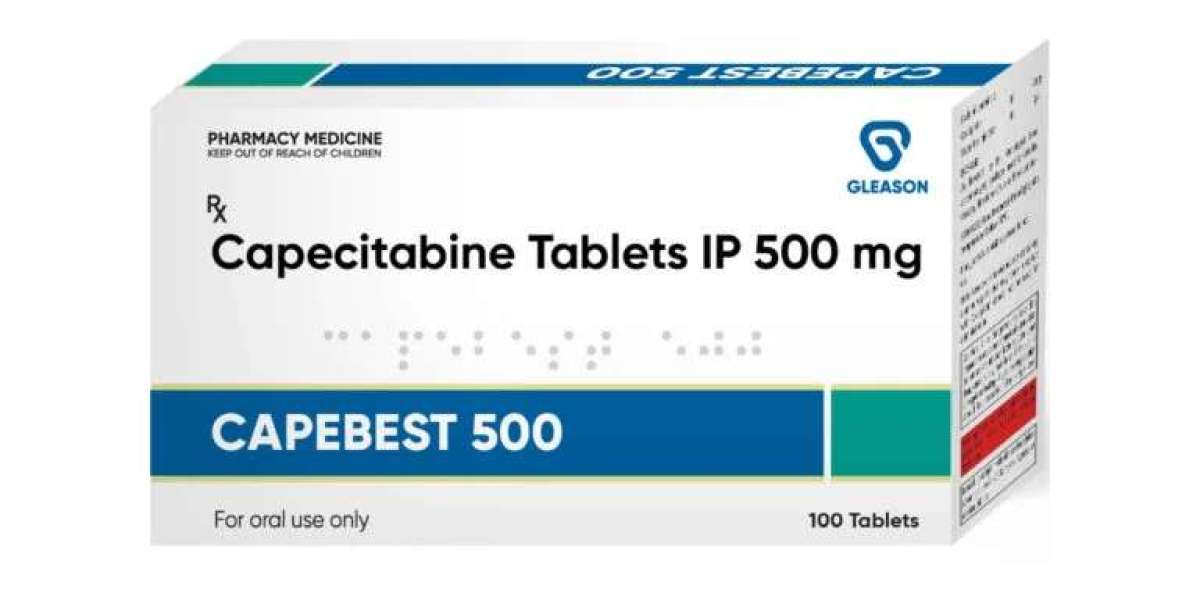Capebest 500 Tablet is a widely used medication in the field of oncology. This article offers a complete overview of the drug, including its composition, usage, side effects, precautions, and much more. Our goal is to provide a detailed and authoritative guide to help readers understand everything they need to know about Capebest 500.
What is Capebest 500 Tablet?
Capebest 500 Tablet is a chemotherapy drug containing Capecitabine as its active ingredient. It is commonly used for the treatment of several cancers, including breast, colon, and colorectal cancer. Capecitabine is a prodrug, which means it transforms into its active form, 5-fluorouracil (5-FU), within the body to target and inhibit the growth of cancer cells.
How Capebest 500 Works
Capebest 500 operates by disrupting the DNA synthesis of cancer cells. Upon ingestion, Capecitabine converts into 5-FU in the body. This active metabolite interferes with the DNA and RNA production of rapidly dividing cancer cells, effectively halting their growth and replication. Its targeted action minimizes damage to normal, healthy cells.
Uses of Capebest 500 Tablet
Capebest 500 Tablet is prescribed for the treatment of various types of cancers, including:
- Colon Cancer: It is often administered post-surgery to reduce the risk of cancer recurrence.
- Rectal Cancer: Used in combination with other therapies to manage locally advanced or metastatic rectal cancer.
- Breast Cancer: Particularly effective in advanced stages, often in combination with other drugs such as docetaxel.
- Gastric Cancer: Provides therapeutic benefits in advanced or metastatic stages.
Always consult with an oncologist to understand the suitability and dosage for specific cancer conditions.
Dosage and Administration
Standard Dosage Guidelines
The dosage of Capebest 500 varies based on factors such as the type of cancer, the patient’s weight, age, and overall health. Commonly recommended dosages include:
- Monotherapy: 1250 mg/m² taken orally twice daily for two weeks, followed by a one-week rest period.
- Combination Therapy: Dosage may vary based on the specific combination of drugs and cancer type.
How to Take Capebest 500
- Take the tablet orally with water within 30 minutes after a meal.
- Ensure strict adherence to the prescribed schedule to achieve optimal results.
- Do not crush, chew, or break the tablet.
Missed Dose or Overdose
- Missed Dose: Take it as soon as possible unless it’s near the time for the next dose.
- Overdose: Seek immediate medical attention if you suspect an overdose. Overdose symptoms may include severe nausea, vomiting, diarrhea, or excessive fatigue.
Potential Side Effects of Capebest 500
Like any chemotherapy drug, Capebest 500 can cause side effects. While some are mild and manageable, others may require immediate medical attention.
Common Side Effects
- Nausea and Vomiting: Frequent but often manageable with anti-nausea medications.
- Diarrhea: May range from mild to severe; stay hydrated and consult a doctor if persistent.
- Fatigue: Common in most patients; adequate rest is recommended.
- Hand-Foot Syndrome: Redness, swelling, and discomfort in the palms and soles.
- Loss of Appetite: May lead to unintended weight loss.
Serious Side Effects
- Severe abdominal pain or bloody stools.
- Signs of infection such as fever, chills, or persistent sore throat.
- Jaundice (yellowing of the skin or eyes).
- Chest pain or shortness of breath.
What to Do in Case of Severe Side Effects?
Contact your healthcare provider immediately if you experience severe or unusual symptoms. Timely intervention can prevent complications.
Precautions and Warnings
Before Starting Capebest 500
- Inform Your Doctor About Medical History: Especially if you have liver or kidney disease, heart conditions, or allergies.
- Pregnancy and Breastfeeding: Capebest 500 is not recommended for use during pregnancy or breastfeeding due to potential risks to the baby.
During Treatment
- Regular Monitoring: Blood tests are essential to monitor white blood cells, liver function, and overall health.
- Avoid Alcohol: Alcohol can exacerbate side effects like nausea and liver damage.
- Hydration: Stay well-hydrated to manage side effects like diarrhea.
Drug Interactions
Capebest 500 may interact with other medications, potentially altering their effectiveness. Notify your healthcare provider if you are taking:
- Anticoagulants (e.g., warfarin): May increase bleeding risk.
- Phenytoin: Used for seizures, its levels can increase when taken with Capebest.
- Leucovorin: Enhances the effect of Capecitabine but may also intensify side effects.
- Over-the-counter medications, supplements, or herbal remedies.
Storage and Disposal
- Storage: Keep the tablets in their original packaging, away from direct sunlight and moisture. Store at room temperature (15–30°C).
- Disposal: Do not flush unused medication. Follow local regulations for the safe disposal of pharmaceuticals.Frequently Asked Questions (FAQs)
1. Is Capebest 500 Tablet Safe for Elderly Patients?
Yes, but older adults may be more susceptible to side effects. Dose adjustments may be necessary based on tolerance levels.
2. Can I Drive After Taking Capebest 500?
It is advisable to avoid driving if you experience dizziness or fatigue after taking the medication.
3. How Long Does the Treatment Last?
Treatment duration varies depending on the type and stage of cancer. Always follow your oncologist’s recommendations.
Capebest 500 Tablet plays a pivotal role in cancer treatment, offering hope to patients worldwide. Proper usage, adherence to guidelines, and regular medical supervision ensure the best outcomes. Always consult a healthcare professional for personalized advice.








